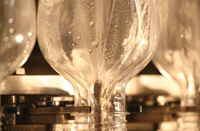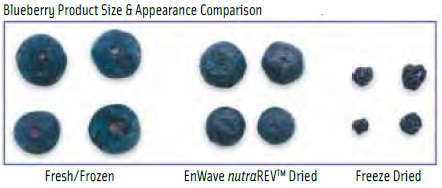Exponential Innovation
Four exhibiting companies showcase advances in container sterilization, dehydration technology, high-pressure sterilization, and ‘clean-label’ starches.
While innovations in food technology were sprinkled throughout the IFT Annual Meeting & Food ExpoB., several companies received special recognition for their novelty. At Sunday morning's keynote session, incoming IFT President Marianne Gillette and President-Elect Bob Gravani announced and presented four companies with the 2009 IFT Food Expo Innovation Awards. The recipients are Ecolab Inc., EnWave Corp., National Center for Food Safety & Technology, and National Starch Food Innovation.

The 2009 IFT Food Expo Innovation Awards program was designed to recognize outstanding innovation in products, ingredients, applications, instruments, equipment, technology, and services. The program was open only to companies exhibiting at the 2009 IFT Food Expo in Anaheim. To be eligible, the product, technology, or service must have been commercially available since January 1, 2008. The entry period ran from early January through early April 2009.
A panel of eight jurors from industry, academia, and government with broad expertise in research & product development, processing & packaging technology, analytical tests, and food safety selected the four companies and their innovations from 49 qualified entries. Judging criteria included degree of innovation, solves a problem relevant to food science and technology, technical advancement, benefits to food manufacturers and consumers, and scientific merit.
-
Ecolab Inc. (www.ecolab.com) garnered the 2009 IFT Food Expo Innovation Award for its Peroxyacetic Acid (POAA)-based Commercial Sterilant, which sterilizes plastic bottles at lower temperatures than hydrogen peroxide, thereby reducing energy. It also mitigates bottle shrinkage and peroxide residuals.
The two-part system - a 15% POAA solution and an adjuvant that is dosed into the POAA to enhance the contact of the POAA with the bacterial spores - is the first peracid-based sterilant system to receive FDA's Letter of Non-Objection on a high-speed, low-acid rotary filler using PET bottles. It is also the first and only sterilant registered with the EPA for use against Bacillus cereus - a pathogen that is the most resistant to peroxyacetic acid-based sterilants.
"Since the sterilant can be used to sterilize nonporous packages, the need of a cold supply chain is eliminated," noted a juror. "This is another energy savings (cost) both for the consumer and processor."
-
EnWave Corp. (www.enwave.net) won the award for its nutraREV Dehydration Technology. The radiant energy vacuum technology delivers rapid, low-temperature dehydration of fruits, vegetables, snack foods, and herbs. Through the application of microwave energy in a low-pressure or vacuum environment, the technology dehydrates using less than one-third the energy of freeze drying with one-sixth the capital cost. Energy savings are achieved by drying without freezing, while drying temperatures are kept low by the application of vacuum pressure.
--- PAGE BREAK ---
-
The technology dries food in minutes vs hours or days while maintaining excellent color and flavor along with similar nutrients and shelf life to freeze-dried products. nutraREV provides producers of dried fruits and vegetables with the ability to control their preferred level of moisture content, allowing for the creation of entirely new consumer products such as "puffed" berries. Blueberries can be produced in a form that is chewy like a raisin or crisp like a chip, depending upon residual moisture content set by the producer.

In March 2009, EnWave Corp. announced that it has completed the sale of its first continuous nutraREV food dehydration equipment to CAL-SAN Enterprises, Richmond, B.C. The company farms and processes blueberries and cranberries.
The technology provides for rapid dehydration via vacuum microwave and allows process design for a variety of finished product moisture contents, said a juror.
-
National Center for Food Safety & Technology (www.ncfst.iit.edu) was honored for its Pressure Assisted Thermal Sterilization (PATS) - an FDA-accepted processing technology which combines mild heat with high pressure to produce commercially sterile low-acid food products with equivalent or better quality than frozen foods.PATS is a promising new technology that significantly improves the quality of thermally processed foods while simultaneously eliminating the food safety risks associated with dangerous bacteria such as Clostridium botulinum and its toxins. It provides an alternative to retort processing, and extends the quality improvement benefits of classical high-pressure processing.
"An FDA-accepted system uses mild heat with high pressure to produce shelf-life stable food with better quality," stated a juror. "This breakthrough technology is important to ensure the safety and quality of low-acid foods."
- National Starch Food Innovation (www.foodinnovation.com) captured the 2009 IFT Food Expo Innovation Award for its NOVATION Starches, which can be used to manufacture products such as salad dressings with texture attributes and process tolerance that were only possible with modified food starches.
Consumers are increasingly interested in clean-label food products that are free from artificial additives and chemically modified ingredients. Many products are available to meet customers' needs in this area. However, it has been difficult to replace cold-water swellable (CWS) modified food starch in applications that require a high degree of shear or in low-pH products. And most native CWS starches do not offer the high degree of process tolerance offered by modified CWS starches. NOVATION 4300/5300 starches offer levels of temperature, shear, and pH tolerance that enable the production of high-quality, clean-label food products. These starches are labeled as "corn starch" on the ingredient statement. The technology meets consumer needs, said a juror.
Bob Swientek is Editor in Chief, Food Technology ([email protected]).
